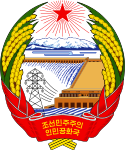Constitution of North Korea
 |
|---|
|
|
The Socialist Constitution of the Democratic People's Republic of Korea is the constitution of the Democratic People's Republic of Korea (DPRK), commonly known as North Korea.
Previous constitutions were adopted in 1948,[1] 1972,[2] 1992,[3] and 1998.[4] The constitution currently in force dates from April 2009[5] and lays out the framework of the national government and the functions of the ruling Communist party, the Workers' Party of Korea in relation to the government's operations.
The constitution establishes North Korea's official name and its status as a socialist state.[6] The country is defined as a "dictatorship of the people's democracy" (a wording that closely follows the Chinese model of the people's democratic dictatorship) under the leadership of the Workers' Party. It guarantees civil and political rights, such as freedom of expression, the right to elect officials, the right to a fair trial, and freedom of religion. It asserts the right of every citizen to work, education, opinions, food, and health care.
Since the death of Kim Il-sung in 1994, Kim's son Kim Jong-il has maintained military rule, ruling North Korea as chairman of the National Defence Commission of North Korea. The status of the North Korean military (the Korean People's Army, KPA) was enhanced, and it appears to occupy the center of the North Korean political system, with all other aspects of society are subordinated to it, as articulated by the Songun ("Military First") policy. Kim's public activity focused heavily on his role as commander-in-chief, giving "on-the-spot guidance" at places and events related to the military.[7] The Constitution is divided into three parts with each of them having several articles.
2009 revision
In September 2009, it was reported North Korea revised its constitution several months previously, removing all references to communism and enshrining Kim Jong-il as "Supreme Leader" under Article 100.[8][9] The term 'communism' was replaced with 'Songun'.[10] It also called for respect for human rights for the first time.[11]
References
- ^ Kim, Hyung-chan; Kim, Tong-gyu (2005). Human remolding in North Korea: a social history of education. University Press of America. p. 134.
- ^ Constitution of North Korea (1972). Wikisource.
- ^ Hale, Christopher (2002). 'North Korea in Evolution: The Correlation Between the Legal Framework and the Changing Dynamic of Politics and the Economy.' Korea Observer, Vol. 33 No. 3
- ^ North Korea drops Communism from its Constitution. Azerbaijan Press Agency. September 28, 2009.
- ^ Chi-dong, Lee (September 28, 2009). N. Korea's revised constitution gives more power to Kim Jong-il . Yonhap.
- ^ Scalapino, Robert A.; Kim, Chun-yŏp (1983). North Korea today: strategic and domestic issues. Institute of East Asian Studies, University of California, Berkeley, Center for Korean Studies. p. 24.
- ^ Choi, Jinwook (1999). Changing Relations between Party, Military, and Government in North Korea and Their Impact on Policy Direction (PDF). Stanford University.
- ^ North Korea 'drops communist references'. Radio Television Hong Kong. September 28, 2009.
- ^ Jeong-ju, Na (September 28, 2009). NK Constitution States Kim Jong-il as Leader. The Korea Times.
- ^ N.Korean Parliament Boosts Kim Jong-il's Powers. The Chosun Ilbo. September 25, 2009.
- ^ N Korea's new constitution mentions human rights. Associated Press. September 28, 2009.
